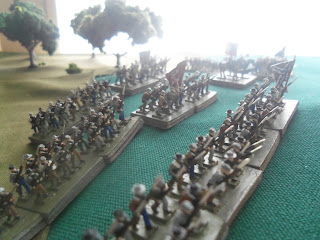John Brown Gordon was born Jan 6, 1832 on a farm in Upson County Georgia. He was the fourth of twelve siblings. He went to the University of Georgia but left before he graduated. He studied Law in Atlanta and passed the bar exam. John and his father Zachariah invested in a series of coal mines in Tennessee and Georgia.
At the outbreak of the war, Gordon was elected Captain of a company of mountaineers. He presented himself and his company to the Governor of Georgia for service in the war. At the time Georgia hadn't issued a call for men yet. Discouraged, but not defeated, Gordon marched his Company to Montgomery Alabama where they were formed up with the 6th Alabama Infantry Regiment.
Gordon saw action at the head of his regiment under then, Brigadier General Robert Rodes During the battle of Seven Pines in May/ June 1862. When Rodes was wounded, Gordon was advanced to lead the Brigade. He showed fearless zeal in the face of the enemy during the Seven Days Battles. He would pace fearlessly among his men shouting orders and firing his pistol. Enemy bullets shattered the handle of his pistol, pierced his canteen, and ripped away part of his uniform coat front. The men of the brigade claimed that he had a charmed life with the amount of danger he was exposed to and had come away unscathed. The first test to this belief came at the Battle of Malvern Hill. He was temporarily blinded as dirt was kicked up in his face.
 |
| A impressive list of wounds sustained from the war. |
After several months of recuperation, Gordon returned to duty in June 1863. This time in the lead of a Brigade under General Jubal Early's Division. Gordon continued to serve throughout the war, participating in The Gettysburg Campaign, The Battle of the Wilderness, Spotsylvania Courthouse, The Valley Campaign of 1864, The Siege of Petersburg. He was a Corps Commander with General Lee at Appomattox. After the war, Gordon returned home to Georgia and went into politics serving as State Senator and as Governor.
 |
| Brig Gen. John B. Gordon and his Georgia Brigade |













No comments:
Post a Comment
Note: Only a member of this blog may post a comment.